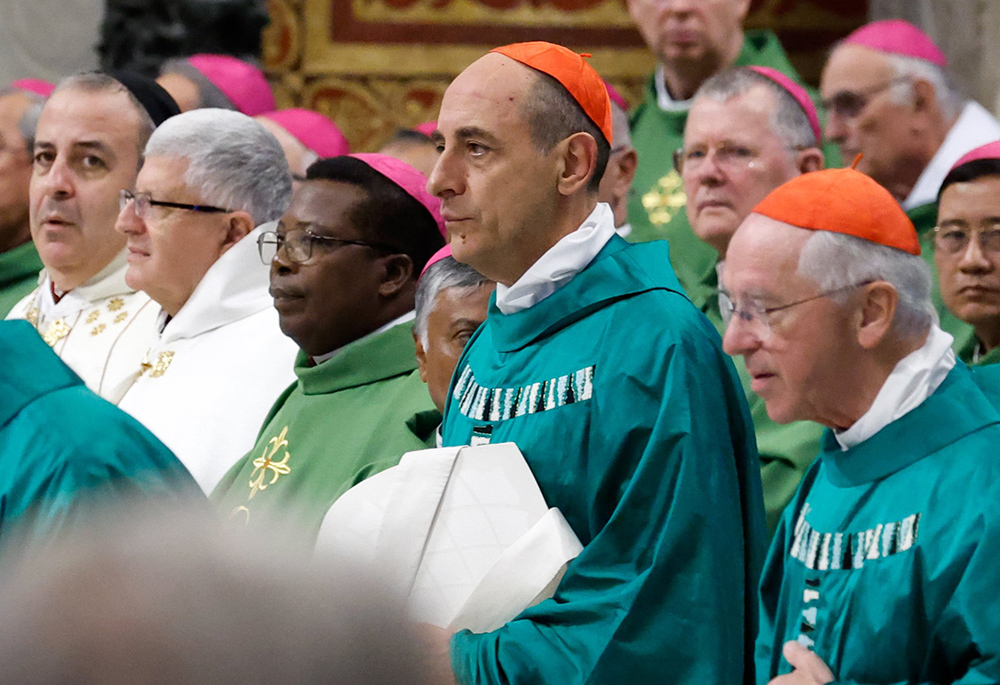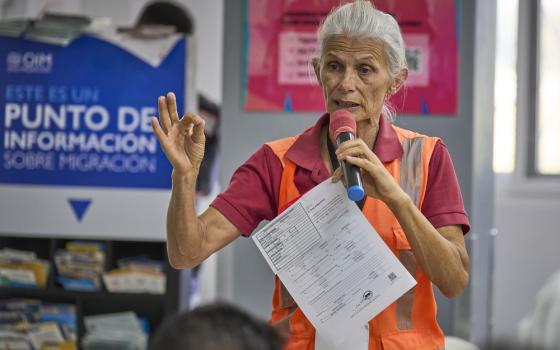Pope Francis greets visitors in St. Peter's Square at the Vatican to pray the Angelus Aug. 20, 2023. (CNS/Vatican Media)
For Catholics who know about it, the church's worldwide synod on synodality is bringing either hope or indigestion.
Now more than two years into its proposed process of gathering Catholics everywhere to pray and talk about the best means of spreading the Gospel, the synod's topics and methods remain unknown to many Catholics, churchgoing or not.
Why? For starters, the project depends on the cooperation of bishops. But more and more bishops are turning away from Pope Francis' nonjudgmental, inclusive attitude.
In the United States, according to papal nuncio Cardinal Christophe Pierre, "Francis is now seen as the big sinner" by some U.S. bishops. There and elsewhere, many bishops are repudiating a recent Vatican document proposing that blessings may be given freely without an investigation of the recipient's — or recipients' — moral life.
The December 2023 document from the Dicastery for the Doctrine of the Faith, Fiducia Supplicans — "Begging for confidence" — caused an immediate and ongoing uproar. The document's purpose, to offer "a specific and innovative contribution to the pastoral meaning of blessings," reviews the nature of blessings while reiterating the church's ban on any liturgical recognition of gay marriages.
To be kind, the document is misunderstood by many and misrepresented by others. The controversy has been aided, too, by reports of a 1998 book, titled Mystical Passion: Spirituality and Sensuality, written by the dicastery's new prefect, Cardinal Victor Fernández.

Cardinal Victor Manuel Fernández, prefect of the Dicastery for the Doctrine of the Faith, is seen in a file photo as he joins Pope Francis for a Mass at the end of the first session of the assembly of the Synod of Bishops on synodality in St. Peter's Basilica Oct. 29, 2023, at the Vatican. (CNS/Lola Gomez)
Fernández's book, which he withdrew nearly immediately on publication, includes as its sixth chapter a 16-year-old girl's imaginary encounter with Jesus as he is held by his mother in the style of the Pieta. Related in the style of the Bible's poetic Song of Songs, she imagines Jesus resurrected. Those unfamiliar with Spanish mystical tradition and those who are quick to criticize anyone associated with Francis, can find the book, and especially this section, salacious.
The outer edges of Catholic media, seemingly fixated on sexual matters anyway, have been reduced to a bunch of sniggering teenaged boys by the fact that a Catholic cardinal dares to explain the analogies of mystical experience in sexual terms.
Which brings us back to the responses to blessing "same-sex couples," or "a couple in an irregular situation," as Fiducia Supplicans describes those who may ask to be blessed. It says "an exhaustive moral analysis" should not be a precondition; there is no requirement for "prior moral perfection." (One thinks of the thousands of persons crowding St. Peter's Square each Sunday to receive Francis' blessing following the Angelus. Imagine personal interviews by some sort of morality police!)
Advertisement
This is not to say there are not difficulties with the document. One problem is that the writer buried the lede. Church groups in Germany and elsewhere have pushed for church acknowledgement and ceremonial ratification of gay marriage and of remarried divorced men and women. But only near its end does the document affirm that liturgical blessings of gay marriages and any rites in conjunction with a civil ceremony are not permitted.
Bishops in large swaths of Africa, all of Russia and the Balkan States have made it clear they will resist performing blessings. In the United States, Australia, Brazil, France, Italy and even Argentina, among other countries, the reaction is mixed. Bishop Martin Mtumbuka of Malawi led the African dissent with a withering Christmas Eve homily. He flatly refused to accept the doctrine office's teaching (it was apparent from some of his talk that he had missed its flat-out ban on gay marriage).
Another problem with the document is that it was released as the Vatican was already winding down for Christmas, and the Vatican's attempt at damage control — a clarification by Fernández — only appeared Jan. 4.
There do not seem to have been any earlier attempts at spin control. That is, it appears that no friendly bishops received talking points in advance, and many — if not most — were caught off guard amid Christmas preparations and festivities when the document first appeared.
Even with a clarification, the Roman Catholic bishops of Africa and Madagascar voted to ignore Fiducia Supplicans.
All this involves the question of synodality. Individual blessings are freely given for animals, buildings, meals, rosary beads and all manner of things and people. The misunderstanding here, propelled by some media, is rooted in a rejection of both synodality and the beauty of the human person.
Synodality requires listening, and the objecting bishops are reading more into the statement than it intends. The beauty of the human person is the bedrock of Christian belief, and by refusing a blessing on anyone, the objecting bishops are denying that beauty.
Even so, no matter how bumpy the road to synodality may be, Francis is determined to keep trying to move the church forward.





